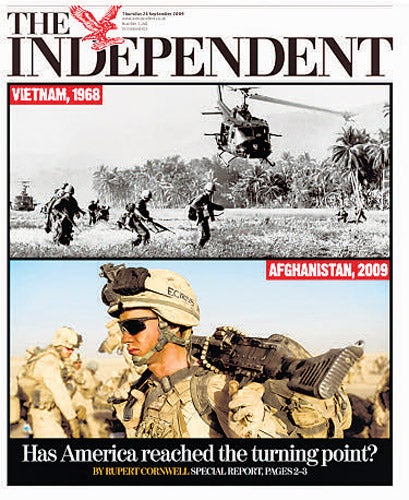Crucial talks begin on US strategy in Afghanistan
Obama meets with advisers to determine fate of military mission

Barack Obama has begun a series of meetings with his top national security team on a pivotal re-assessment of US strategy in Afghanistan. He essentially faces a choice between scaling back the increasingly unpopular war or agreeing a request by his top commander in the country to send up to 40,000 more American troops into the eight-year conflict.
Even before the deliberations began, the deteriorating situation on the ground was underlined by a roadside bomb, believed to have been placed by Taliban insurgents, that killed at least 30 civilians travelling on a bus from Herat to Kandahar.
The incident, one of the deadliest of its kind in months, came days after the UN said that civilians were being killed in greater numbers than at any point since the 2001 invasion – almost three quarters of them by the Taliban.
It also underlined the dilemma facing a US President who is confronted by increasing resistance from the public and from within his own Democratic party to a greater military commitment to the war, and who is yet only too aware that a pull-back risks a renewed Taliban takeover of the country.
Yesterday's meeting was only a start and no final decision is likely for several weeks. General Stanley McChrystal, the commander of US and Nato forces in Afghanistan, is believed to be seeking a force increase of between 30,000 and 40,000 men, but that request has not been formally handed to the President.
"This isn't going to be finished in one meeting, it's not going to be finished in several meetings," said Robert Gibbs, the White House spokesman. Anders Fogh Rasmussen, the Nato secretary general, made the same point after talks with Mr Obama yesterday. Overall strategy was the most important element, Mr Rasmussen said; "the first thing is not numbers."
The pressure on Mr Obama has increased sharply in recent months as a result of mounting US and allied military deaths, growing civilian casualties, a corruption-stained election purportedly won by the incumbent President, Hamid Karzai and, earlier this month, the leaking of a report by General McChrystal warning that without more US troops, the war might effectively be lost within 12 months.
The one point on which there seems to be agreement is that – for better or worse – Mr Karzai will continue in power, with or without a run-off vote. US officials said that Hillary Clinton, the US Secretary of State, and her leading Nato counterparts reached a consensus to this effect at a meeting last week on the sidelines of the UN General Assembly.
Afghanistan's Electoral Complaints Commission is pouring through thousands of complaints of electoral fraud resulting from last month's poll and a final result could emerge in 10 days.
Mr Karzai, who leads with a provisional tally of 54.6 per cent, admits that some fraud took place but not enough to affect the outcome. But the key question is not so much whether Mr Karzai remains President but whether, given his tainted re-election, he can command the trust of his people.
Join our commenting forum
Join thought-provoking conversations, follow other Independent readers and see their replies
Comments
Bookmark popover
Removed from bookmarks